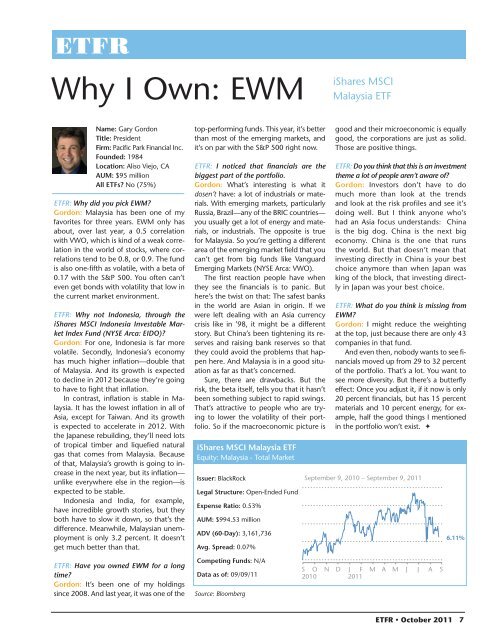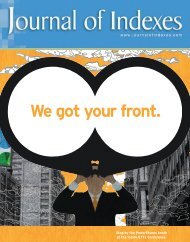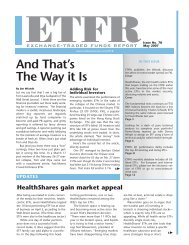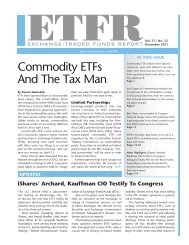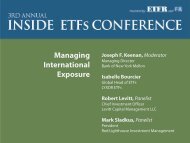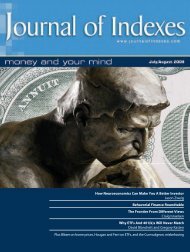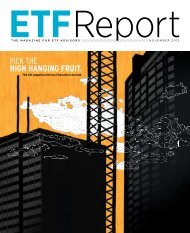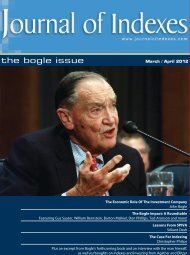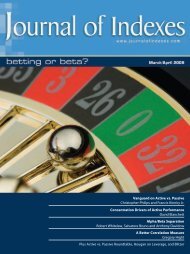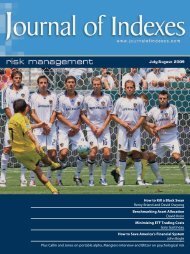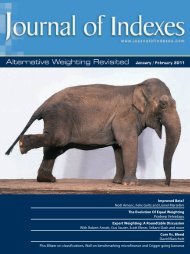Bigger Isn't Always Better - IndexUniverse.com
Bigger Isn't Always Better - IndexUniverse.com
Bigger Isn't Always Better - IndexUniverse.com
Create successful ePaper yourself
Turn your PDF publications into a flip-book with our unique Google optimized e-Paper software.
Why I Own: EWM<br />
iShares MSCI<br />
Malaysia ETF<br />
Name: Gary Gordon<br />
Title: President<br />
Firm: Pacific Park Financial Inc.<br />
Founded: 1984<br />
Location: Aliso Viejo, CA<br />
AUM: $95 million<br />
All ETFs? No (75%)<br />
ETFR: Why did you pick EWM?<br />
Gordon: Malaysia has been one of my<br />
favorites for three years. EWM only has<br />
about, over last year, a 0.5 correlation<br />
with VWO, which is kind of a weak correlation<br />
in the world of stocks, where correlations<br />
tend to be 0.8, or 0.9. The fund<br />
is also one-fifth as volatile, with a beta of<br />
0.17 with the S&P 500. You often can’t<br />
even get bonds with volatility that low in<br />
the current market environment.<br />
ETFR: Why not Indonesia, through the<br />
iShares MSCI Indonesia Investable Market<br />
Index Fund (NYSE Arca: EIDO)?<br />
Gordon: For one, Indonesia is far more<br />
volatile. Secondly, Indonesia’s economy<br />
has much higher inflation—double that<br />
of Malaysia. And its growth is expected<br />
to decline in 2012 because they’re going<br />
to have to fight that inflation.<br />
In contrast, inflation is stable in Malaysia.<br />
It has the lowest inflation in all of<br />
Asia, except for Taiwan. And its growth<br />
is expected to accelerate in 2012. With<br />
the Japanese rebuilding, they’ll need lots<br />
of tropical timber and liquefied natural<br />
gas that <strong>com</strong>es from Malaysia. Because<br />
of that, Malaysia’s growth is going to increase<br />
in the next year, but its inflation—<br />
unlike everywhere else in the region—is<br />
expected to be stable.<br />
Indonesia and India, for example,<br />
have incredible growth stories, but they<br />
both have to slow it down, so that’s the<br />
difference. Meanwhile, Malaysian unemployment<br />
is only 3.2 percent. It doesn’t<br />
get much better than that.<br />
top-performing funds. This year, it’s better<br />
than most of the emerging markets, and<br />
it’s on par with the S&P 500 right now.<br />
ETFR: I noticed that financials are the<br />
biggest part of the portfolio.<br />
Gordon: What’s interesting is what it<br />
dosen’t have: a lot of industrials or materials.<br />
With emerging markets, particularly<br />
Russia, Brazil—any of the BRIC countries—<br />
you usually get a lot of energy and materials,<br />
or industrials. The opposite is true<br />
for Malaysia. So you’re getting a different<br />
area of the emerging market field that you<br />
can’t get from big funds like Vanguard<br />
Emerging Markets (NYSE Arca: VWO).<br />
The first reaction people have when<br />
they see the financials is to panic. But<br />
here’s the twist on that: The safest banks<br />
in the world are Asian in origin. If we<br />
were left dealing with an Asia currency<br />
crisis like in ’98, it might be a different<br />
story. But China’s been tightening its reserves<br />
and raising bank reserves so that<br />
they could avoid the problems that happen<br />
here. And Malaysia is in a good situation<br />
as far as that’s concerned.<br />
Sure, there are drawbacks. But the<br />
risk, the beta itself, tells you that it hasn’t<br />
been something subject to rapid swings.<br />
That’s attractive to people who are trying<br />
to lower the volatility of their portfolio.<br />
So if the macroeconomic picture is<br />
iShares MSCI Malaysia ETF<br />
Equity: Malaysia - Total Market<br />
Issuer: BlackRock<br />
Legal Structure: Open-Ended Fund<br />
Expense Ratio: 0.53%<br />
AUM: $994.53 million<br />
ADV (60-Day): 3,161,736<br />
Avg. Spread: 0.07%<br />
good and their microeconomic is equally<br />
good, the corporations are just as solid.<br />
Those are positive things.<br />
ETFR: Do you think that this is an investment<br />
theme a lot of people aren’t aware of?<br />
Gordon: Investors don’t have to do<br />
much more than look at the trends<br />
and look at the risk profiles and see it’s<br />
doing well. But I think anyone who’s<br />
had an Asia focus understands: China<br />
is the big dog. China is the next big<br />
economy. China is the one that runs<br />
the world. But that doesn’t mean that<br />
investing directly in China is your best<br />
choice anymore than when Japan was<br />
king of the block, that investing directly<br />
in Japan was your best choice.<br />
ETFR: What do you think is missing from<br />
EWM?<br />
Gordon: I might reduce the weighting<br />
at the top, just because there are only 43<br />
<strong>com</strong>panies in that fund.<br />
And even then, nobody wants to see financials<br />
moved up from 29 to 32 percent<br />
of the portfolio. That’s a lot. You want to<br />
see more diversity. But there’s a butterfly<br />
effect: Once you adjust it, if it now is only<br />
20 percent financials, but has 15 percent<br />
materials and 10 percent energy, for example,<br />
half the good things I mentioned<br />
in the portfolio won’t exist. <br />
September 9, 2010 – September 9, 2011<br />
6.11%<br />
ETFR: Have you owned EWM for a long<br />
time?<br />
Gordon: It’s been one of my holdings<br />
since 2008. And last year, it was one of the<br />
Competing Funds: N/A<br />
Data as of: 09/09/11<br />
Source: Bloomberg<br />
S O<br />
2010<br />
N<br />
D<br />
J F M A M J J A<br />
2011<br />
S<br />
ETFR • October 2011 7


